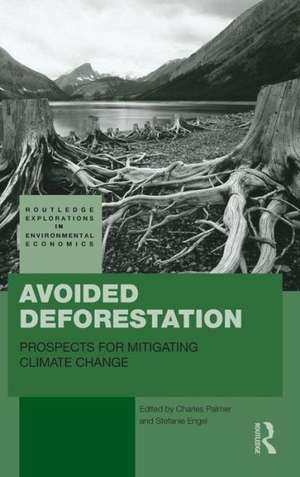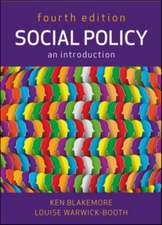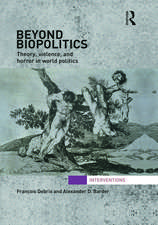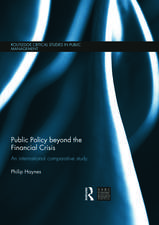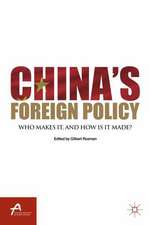Avoided Deforestation: Prospects for Mitigating Climate Change: Routledge Explorations in Environmental Economics
Editat de Charles Palmer, Stefanie Engelen Limba Engleză Hardback – 3 apr 2009
While avoided deforestation, as a policy issue, is not new, the current debate in academic and policy circles on including it in future climate change mitigation strategies such as the Clean Development Mechanism is gathering pace – and this debate is only likely to intensify as negotiations continue over what should be included in the successor agreement to the Kyoto Protocol, which is set to expire in 2012.
Up until now, however, the debate in terms of the scientific and economic implications of avoided deforestation has not been brought together. This book aims to bring together important research findings in the area along with their policy implications, whilst linking avoided deforestation to political economy as well as to the latest developments in environmental and natural resource economics.
| Toate formatele și edițiile | Preț | Express |
|---|---|---|
| Paperback (1) | 200.88 lei 6-8 săpt. | |
| Taylor & Francis – dec 2010 | 200.88 lei 6-8 săpt. | |
| Hardback (1) | 398.44 lei 6-8 săpt. | |
| Taylor & Francis – 3 apr 2009 | 398.44 lei 6-8 săpt. |
Din seria Routledge Explorations in Environmental Economics
-
 Preț: 311.58 lei
Preț: 311.58 lei -
 Preț: 311.18 lei
Preț: 311.18 lei -
 Preț: 314.70 lei
Preț: 314.70 lei - 25%
 Preț: 823.26 lei
Preț: 823.26 lei - 18%
 Preț: 1053.92 lei
Preț: 1053.92 lei -
 Preț: 424.58 lei
Preț: 424.58 lei - 15%
 Preț: 431.75 lei
Preț: 431.75 lei - 13%
 Preț: 289.78 lei
Preț: 289.78 lei - 18%
 Preț: 1403.97 lei
Preț: 1403.97 lei - 25%
 Preț: 827.23 lei
Preț: 827.23 lei -
 Preț: 334.41 lei
Preț: 334.41 lei - 18%
 Preț: 1223.61 lei
Preț: 1223.61 lei -
 Preț: 427.98 lei
Preț: 427.98 lei - 26%
 Preț: 848.93 lei
Preț: 848.93 lei - 18%
 Preț: 1272.54 lei
Preț: 1272.54 lei - 25%
 Preț: 797.37 lei
Preț: 797.37 lei - 18%
 Preț: 1288.46 lei
Preț: 1288.46 lei -
 Preț: 419.11 lei
Preț: 419.11 lei -
 Preț: 283.97 lei
Preț: 283.97 lei -
 Preț: 381.06 lei
Preț: 381.06 lei - 18%
 Preț: 1286.01 lei
Preț: 1286.01 lei -
 Preț: 422.04 lei
Preț: 422.04 lei - 18%
 Preț: 1061.93 lei
Preț: 1061.93 lei - 18%
 Preț: 1064.70 lei
Preț: 1064.70 lei -
 Preț: 493.80 lei
Preț: 493.80 lei - 18%
 Preț: 1336.46 lei
Preț: 1336.46 lei - 18%
 Preț: 1065.06 lei
Preț: 1065.06 lei - 26%
 Preț: 821.46 lei
Preț: 821.46 lei - 25%
 Preț: 1022.48 lei
Preț: 1022.48 lei - 18%
 Preț: 1226.37 lei
Preț: 1226.37 lei -
 Preț: 393.26 lei
Preț: 393.26 lei -
 Preț: 418.22 lei
Preț: 418.22 lei - 25%
 Preț: 824.53 lei
Preț: 824.53 lei - 18%
 Preț: 1167.71 lei
Preț: 1167.71 lei - 18%
 Preț: 1382.75 lei
Preț: 1382.75 lei -
 Preț: 489.99 lei
Preț: 489.99 lei - 18%
 Preț: 1285.17 lei
Preț: 1285.17 lei - 18%
 Preț: 1067.84 lei
Preț: 1067.84 lei - 12%
 Preț: 303.64 lei
Preț: 303.64 lei
Preț: 398.44 lei
Nou
Puncte Express: 598
Preț estimativ în valută:
76.28€ • 78.49$ • 64.30£
76.28€ • 78.49$ • 64.30£
Carte tipărită la comandă
Livrare economică 28 februarie-14 martie
Preluare comenzi: 021 569.72.76
Specificații
ISBN-13: 9780415447126
ISBN-10: 0415447127
Pagini: 272
Ilustrații: 22 b/w images, 32 tables and 22 line drawings
Dimensiuni: 156 x 234 x 20 mm
Greutate: 0.66 kg
Ediția:1
Editura: Taylor & Francis
Colecția Routledge
Seria Routledge Explorations in Environmental Economics
Locul publicării:Oxford, United Kingdom
ISBN-10: 0415447127
Pagini: 272
Ilustrații: 22 b/w images, 32 tables and 22 line drawings
Dimensiuni: 156 x 234 x 20 mm
Greutate: 0.66 kg
Ediția:1
Editura: Taylor & Francis
Colecția Routledge
Seria Routledge Explorations in Environmental Economics
Locul publicării:Oxford, United Kingdom
Public țintă
Postgraduate and UndergraduateCuprins
1. Introduction: reducing CO2 emissions through avoided deforestation? Part 1: The Cost Effectiveness of Avoiding Deforestation 2. The costs of avoided deforestation as a climate change mitigation option 3. Economics of avoiding deforestation 4. Assessing the economic potential for reducing deforestation in developing countries Part 2: Policy and institutional barriers to avoided deforestation 5. International policy and institutional barriers to reducing emissions from deforestation and degradation in developing countries 6. Reducing carbon emissions by slowing deforestation: REDD initiatives in Brazil 7. Choosing avoided deforestation baselines in the context of government failure: the case of Indonesia’s plantations policy 8. Will credits from avoided deforestation in developing countries jeopardize the balance of the carbon market? Part 3: Insights for Effective and Efficient Avoided Deforestation Policy 9. Leakage from avoided deforestation compensation policy: concepts, empirical evidence, and corrective policy options 10. A scalable approach for setting avoided deforestation baselines 11. Human choices and policies’ impacts on ecosystem services: improving evaluations of payment and park effects on conservation and carbon 12. Increasing the efficiency of forest conservation: the case of payments for environmental services in Costa Rica 13. The Role of Risk in Targeting Payments for Environmental Services 14. Prospects for Mitigating Climate Change Through avoided deforestation: conclusions and outlook.
Notă biografică
Charles Palmer is currently a Senior Researcher at the Institute for Environmental Decisions at the ETH Zurich in Switzerland, specializing in environmental and development economics.
Stefanie Engel is Professor of Environmental Policy and Economics at the Institute for Environmental Decisions at the ETH Zurich in Switzerland.
Stefanie Engel is Professor of Environmental Policy and Economics at the Institute for Environmental Decisions at the ETH Zurich in Switzerland.
Recenzii
'It’s a publication of a high scientific level…a book I recommend highly!' - Jean-Pierre Sorg, Schweizerische Zeitschrift für Forstwesen
'Overall I found this a useful, interesting, and readable introduction to the political and economic complexities surrounding the practice of avoided deforestation as a means to reduce climate change. The content is accessible to non-specialists with a general interest in the topic and basic background knowledge, so it ought to appeal to students and policy stakeholders who want to rapidly get up to speed on this important topic. In addition, scientists working in related fields should find it a valuable aid in putting their work in context and for suggesting areas that require more robust evidence or technical advances.' - Richard Betts, The Journal of Environmental Investing
'Overall I found this a useful, interesting, and readable introduction to the political and economic complexities surrounding the practice of avoided deforestation as a means to reduce climate change. The content is accessible to non-specialists with a general interest in the topic and basic background knowledge, so it ought to appeal to students and policy stakeholders who want to rapidly get up to speed on this important topic. In addition, scientists working in related fields should find it a valuable aid in putting their work in context and for suggesting areas that require more robust evidence or technical advances.' - Richard Betts, The Journal of Environmental Investing
Descriere
Up until now the debate in terms of the scientific and economic implications of avoided deforestation has not been brought together. This book gathers together important research findings in the area along with their policy implications, whilst linking avoided deforestation to political economy as well as to the latest developments in environmental and natural resource economics.
